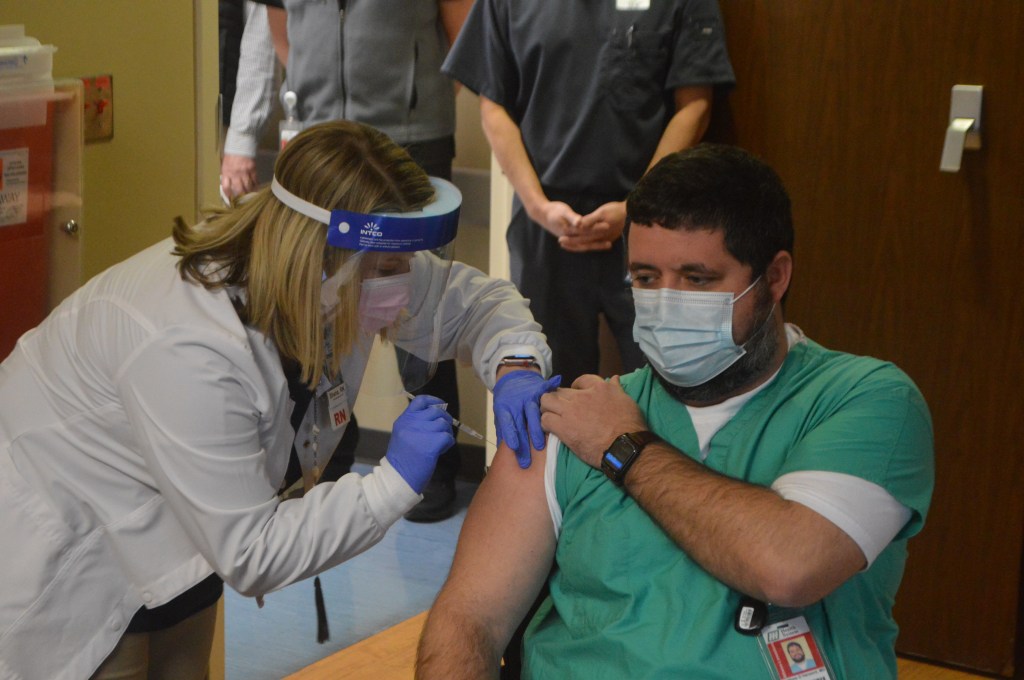READY TO GO: ALH administers 1st COVID-19 vaccine
Published 7:00 am Wednesday, December 16, 2020

- Registered nurse Shana Burroughs, left, administers the first dose of the Pfizer/BioNTech vaccine against the novel coronavirus to Dr. Matt Hanserd on Tuesday at Athens-Limestone Hospital. Hanserd, chief of Athens-Limestone Hospital's COVID response team, is the first person in Limestone County to receive the vaccine after it received federal approval.
Athens earned itself yet another spot in the history books Tuesday, becoming home to one of the first health care workers in Alabama to receive the Pfizer/BioNTech vaccine against the novel coronavirus.
Athens-Limestone Hospital was one of 15 hospitals in the state designated to receive part of the first batch of vaccines to be distributed to front-line health care workers following federal approval of the vaccine. ALH Interim President Traci Collins said the hospital received 1,950 doses in total, with a little more than half of the hospital’s eligible employees saying they wanted to be vaccinated.
“I’m kind of excited about it,” said Dr. Matt Hanserd, chief of ALH’s COVID-19 response team and vice chief of medical staff at ALH. “I’m excited first that our hospital was allowed to get an allotment of vaccine. We’re a smaller hospital, but we had the freezer capability.”
Hanserd was the first in line at ALH for a vaccine, making him one of the first in the state and possibly the first in North Alabama to receive it. He said beyond being among the first, he was just glad to be able to get it.
“If you look at pandemics in the past, or things we had to develop vaccines for, a lot of times, those processes took very long periods of time,” Hanserd said. “They had to develop a lot of the science behind the vaccines. This time, we already had a lot of the science already developed, and we were able to develop vaccines in very short order and start clinical trials.”
Collins said knowing Hanserd and other ALH physicians were on board and willing to get the vaccine makes her that much more comfortable with it.
“These guys are super smart, they study science and research, and if they think it’s safe for them … I trust them,” she said.
The pandemic has been particularly rough on health care workers, who can spend most of their days caring for some of the worst effects from the pandemic only to turn around and face conspiracy theories, refusals to wear masks and other measures that foster the spread of the virus in their community. Collins said the summer heat did not provide the break from the virus as originally hoped for, and “every time we think we’re gonna get a little break, it’s like, wham! We’re slammed again.”
She and Hanserd each said the vaccine may provide some hope, but it’s going to take the public’s help.
“I was in a store last night, and I was appalled at the number of people that did not have masks,” Collins said. “People — there’s all kinds of theories about the vaccine, and ‘it’s politically charged,’ and ‘COVID’s not real,’ and ‘masks don’t help,’ but if you were where we are every day and you see what we see, you’d really know different.”
The hospital has handled more and more severe cases as the coronavirus pandemic continues to spread through the area. Limestone County has set three new records for daily confirmed case numbers in the last two weeks, with the latest being 94 on Dec. 11, an increase from 93 on Dec. 7 and 82 on Dec. 3.
All told, there have been 1,004 cases reported in the last 14 days, according to the Alabama Department of Public Health. Forty-nine Limestone Countians — the size of an average Limestone County high school football team — have died since March as a result of COVID-19.
“We’ve worked from Day 1 to fight COVID,” she said. “Our front line workers, they’re tired.”
Hanserd said knowing he’s been vaccinated provides peace of mind, “but the people in the community are going to have to take it at very high rates for us to eliminate this disease.” He also asked the public to remember that just because a vaccine exists and is being administered to certain people now does not mean the virus will go away overnight.
“It’s going to be real important, especially over the Christmas holidays, to social distance, wear your mask, wash your hands and get your flu shot,” Hanserd said. He added the last item was especially important, saying, “I don’t want to admit you to the hospital with flu when I don’t have a bed because of COVID.”
Collins confirmed that the hospital has been near capacity, but as of Tuesday, they did still have some medical beds available. However, there are no beds available in the intensive care unit.
She also asked the public to keep social distancing and wearing masks. State Health Officer Dr. Scott Harris has said the vaccine is not expected to be available to the general public for months, possibly next summer.
In the meantime, ALH plans to continue administering the doses they have received to at-risk employees within their facility and at other facilities in the area, including Decatur-Morgan Hospital and Helen Keller Hospital. Collins said they will receive a second dose for each person who receives the first dose of the Pfizer vaccine within the next three weeks, and they expect to receive an allotment of the vaccine developed by Moderna within days of it receiving federal approval.





